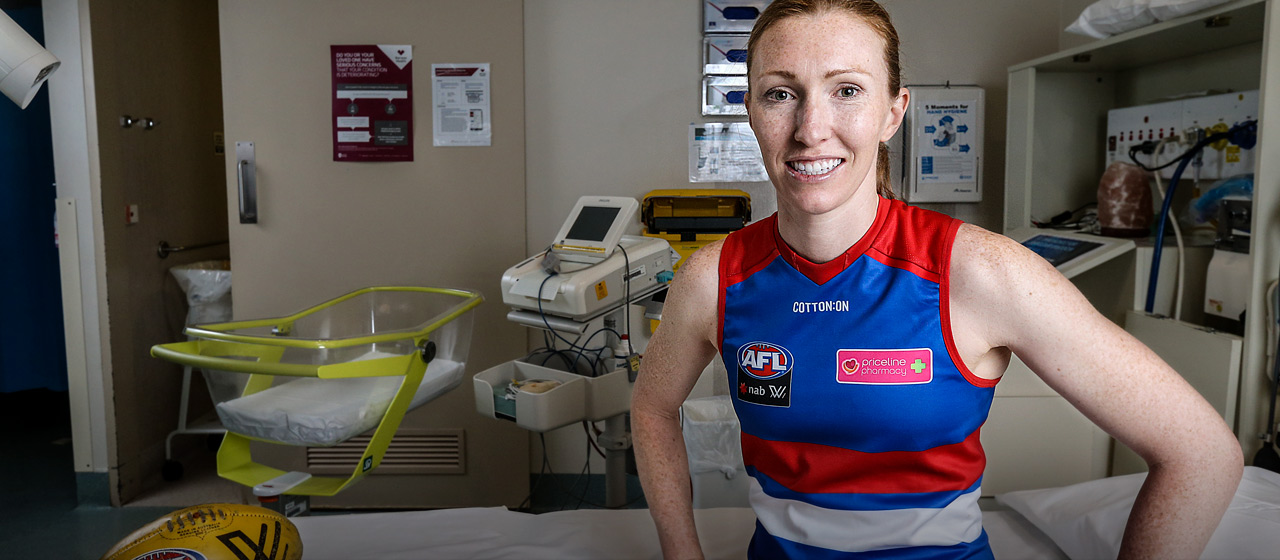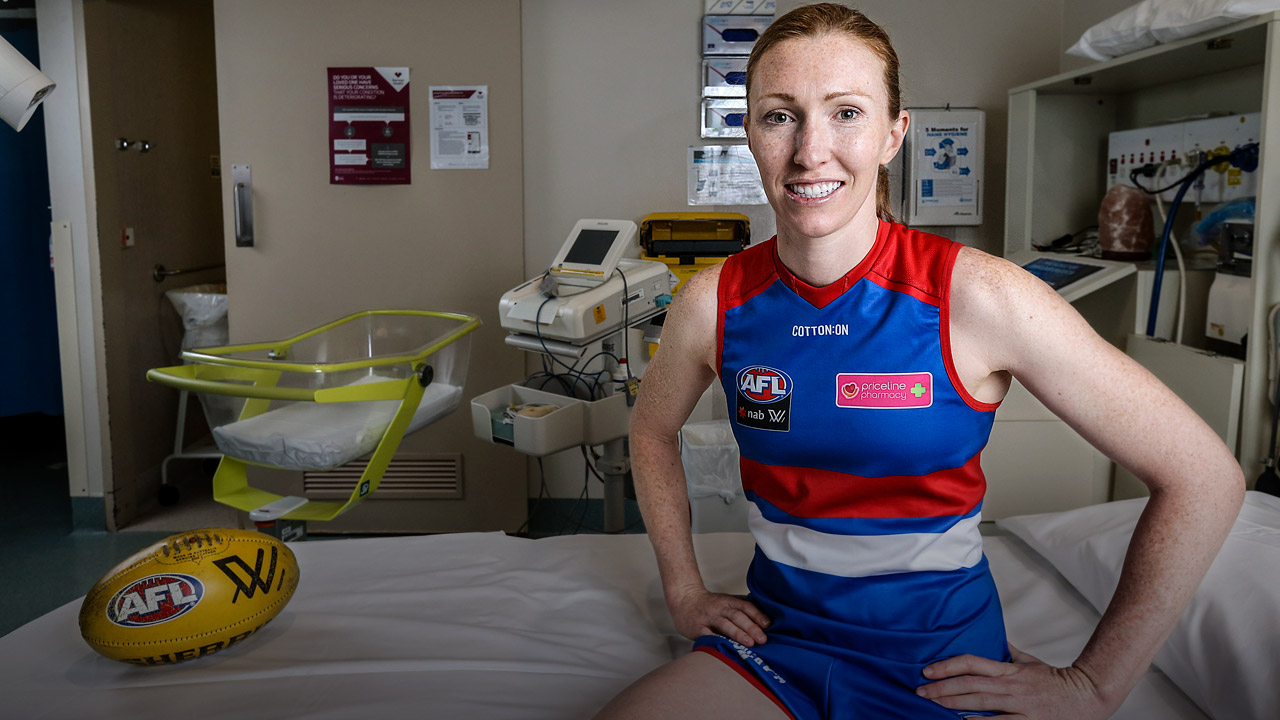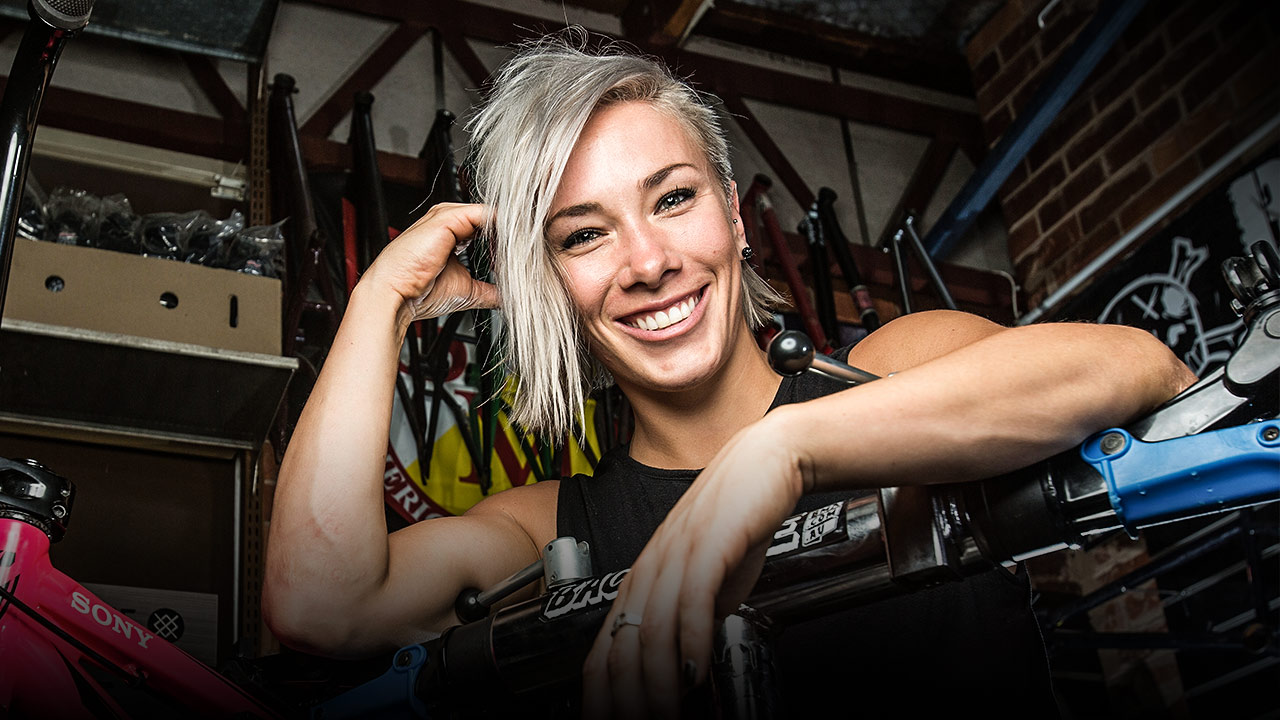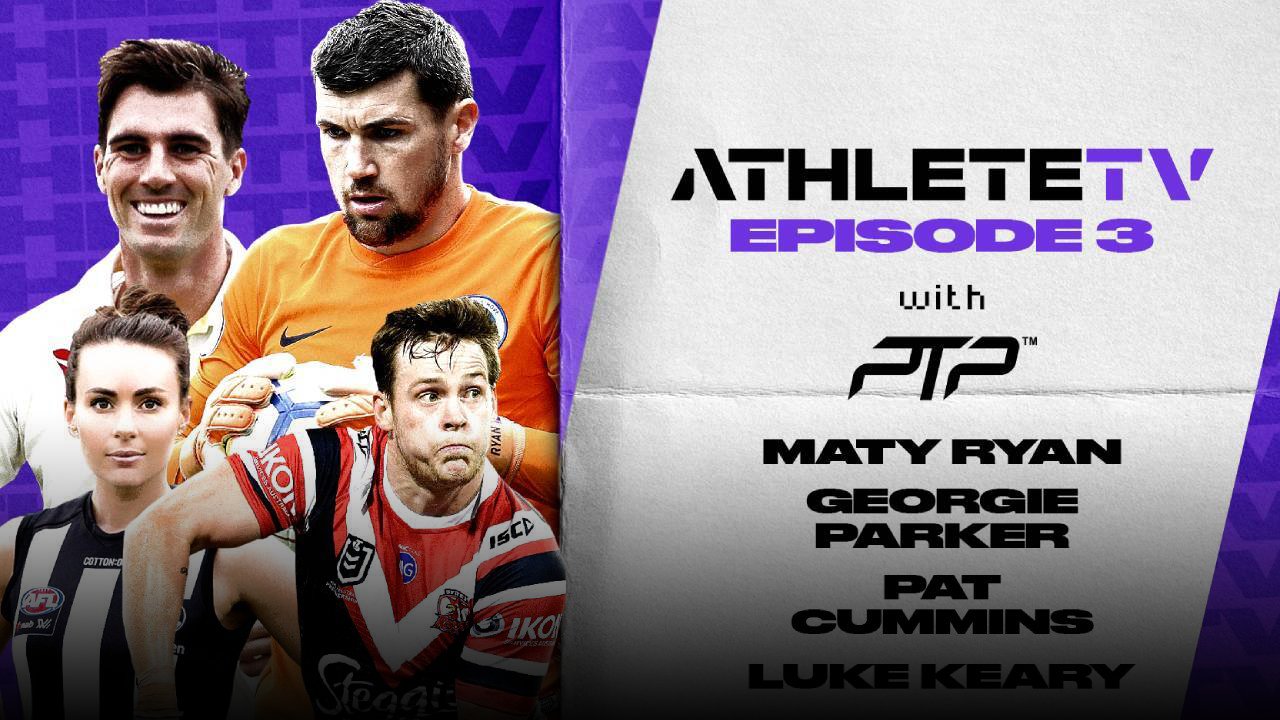AFLW
Footy is the best medicine
My life as a doctor and a footballer has some crazy contrasts. This one’s probably my favourite.
It was a couple of years ago. Daisy Pearce and I were working at the same hospital and the day after our VFL teams had played in a seriously heated battle, I was the operating surgeon on a caesarean list and Daisy was the midwife.
We were virtually handballing these babies across the operating table. The day before, we’d been fighting it out on a footy field.
Even last week, I spoke at an International Women’s Day breakfast, and then I was dashing to work to deliver beautiful young women into their new world.
I’ve been a doctor for nearly eight years now, and I’m in my fourth of six years of specialty training in obstetrics and gynaecology at Monash Health. As a doctor, your focus every day is making sure that you keep women and their babies safe, making sure they feel well-supported and that they enjoy the birthing experience.
Then all of a sudden you’re at a football club talking tactics about how to dominate the opposition team on the weekend, or how best to lay that tackle, or kick that goal. It’s a huge contrast, but thankfully I can switch off quite easily.
The minute I’m at work I’m ‘head down, bum up, get it done’. My colleagues and staff love talking about my footy, though. I’ll leave the room and they’ll say to the patient or the husband, ‘You realise that she plays women’s AFL for the Western Bulldogs’. Then I’ll come back into the room, and that’s all they want to talk about.
But then, going to footy, I’m not a doctor, just a player, and I can get away from all the pressures and demands that you have to think about when you’re at work. To be honest, it’s a bit of therapeutic relief that I can have that outlet and not have to worry about what I do for my day job.
HARD WORK, BUT IT’s WORTH IT
During the pre-season and in-season is when life is most hectic. You’re getting home from training at 10.30pm, you’ve got to do your washing and get ready for the next day and then you’re up at 6.30am to go to work and then go to training after that.
I’m pretty fortunate that during the AFLW season I’ve actually dropped my work hours to 60 per cent of my contract, and that’s allowed me to have a have a bit more breathing space and spare time to sleep — that’s been the most helpful thing.
Being able to work part-time is rare in my position. It’s never really happened before, so I was very lucky that work were so supportive of my sporting endeavours. I’m indebted to my colleagues who are doing the extra night shifts and weekend work during the season.
I’d like to think I’m a pretty good doctor and a very good worker, and my work ethic is probably one of the reasons why my senior colleagues and my bosses allowed me to have this flexible arrangement. They could see my sporting experiences were contributing to me being a better doctor and a better team player and a role model within my workplace.
I do a 14-hour shift on a Thursday, so that’s the big day. Every birth unit or labour ward shift is different. You have no idea who’s going to walk through the door labouring, or what issues or complications of patients you’ll have to deal with, and that can be challenging when it comes to recovery and hydrating your body when you’re also trying to be an athlete.
You’re ‘go go go’ the entire time, so getting the chance to eat, or even get to the bathroom, or making sure you’ve got a water bottle there and hydrating throughout the day can be a challenge. I’ve learnt to balance things a bit better over time. I pick nutritious snacks that are easy and quick to eat on the run.
When I’m asked how I manage everything, I say ‘with great difficulty!’. It just means I don’t have any spare time and I sacrifice going to visit my family in Queensland, which can be sad and challenging sometimes. It also means I have to be very organised and efficient. You rarely just sit and read a book, or watch TV. You have to keep going.
I do a 14-hour shift on a Thursday. That’s the big day. You’re ‘go go go’ the entire time.
But it’s all worth it, because at the end of the day my medical career will always be there for me, and footy is an opportunity I’ll only have for a short period of my life. I wouldn’t want to get 10 years down the track and regret not pursuing this to the best of my ability because it won’t be there when I’m older.
A REMOTE UPBRINGING
I have three younger brothers. We were all born on Thursday Island. My parents decided to go “remote” after they graduated as teachers, and I think Dad took Mum as remote as he could find a school! That was in Bamaga, on the Cape York Peninsula.
It was a Torres Strait Islander community and we were one of only a couple of Caucasian families. Once we started to outgrow the little Queenslander that we called home and when I started getting a bit closer to high school age, we moved down to Julatten, which is a small farming town about an hour and a half north of Cairns. And that’s where home is to this day.
We had a 10-acre property and it was a country upbringing: outdoors all the time, climbing trees and falling out of them, riding motorbikes and horses and fishing in the dam. The four of us were very competitive. I absolutely loved it.
Growing up around indigenous kids when we lived in Cape York, I remember they had this natural running ability and were incredibly quick. Mum always jokes that that’s how I got my athleticism and my speed: because I was competitive and wanted to keep up with these raw, talented, indigenous Australians.
At the Port Douglas Little Athletics Club, I did mainly sprinting, a bit of long jump and high jump as well, and then towards the end of high school I concentrated on the 100 metre hurdles. In Year 12, I won a bronze medal at the national championships. That was probably my biggest achievement in athletics.
My brothers played a bit of rugby league but, up to that point, I’d never really seen anyone play footy. I’d only seen this chaotic game on TV every now and then as I was flicking channels, without really knowing what that was. Our family didn’t follow the AFL, as we lived in Queensland, where it isn’t a dominant game.
It wasn’t until I was studying medicine at James Cook University that I ran into some girls in Cairns who were kicking a footy, and for some reason I went up to them and said ‘Do you play AFL?’.
They welcomed me into their team and said, ‘Come down and have a go’. I got addicted to it pretty quickly. It allowed me to utilise my natural athleticism, to be able to run and jump and sprint, but it also gave me the experience of a team dynamic that I hadn’t really experienced in other sports.
Mum always jokes that that’s how I got my athleticism and my speed: because I was competitive and wanted to keep up with these raw, talented, indigenous Australians.
I played soccer, touch football and a little bit of rugby union at university, but nothing compared to AFL. I think the combination of all the skills and the fact that any person can play it – that no matter how big or tall or fast or slow there was always a position on the field that you could fill – was what got me hooked.
After I graduated in 2011, I did two years as an intern and junior doctor in Brisbane, but I didn’t really know where I wanted to pursue my medical career. I thought about being a GP and going back to a rural community, and I’d also enjoyed my obstetrics rotation. And that was the time that women’s AFL was starting to get some momentum within the media and a bit of backing to support having an AFL women’s competition by 2017.
There were a couple of women’s exhibition matches held in Melbourne in the lead-up to the inaugural season and I remember watching those and thinking, ‘Wow, maybe if I worked hard enough at footy I could actually be playing against these players who had been drafted’. Players like Daisy Pearce, Katie Brennan, Aasta O’Connor and Karen Paxman.
So I decided to go on a bit of a life adventure and go to the state where women’s AFL was most dominant, and that was Victoria, while also finding where I wanted to pursue my medical career.
FOOTBALL HEAVEN, injury hell
When I got the job at Monash, I thought ‘Well, I’ll go down for a year’. I told my parents I’d be back in a year. That was nearly five years ago. I packed up my car and drove to Melbourne with my brother. I didn’t know a single person till I got here, so that was quite daunting. But it’s the best move I could have made. As soon as I got here, I felt completely at home.
Not only was I thriving playing for the Diamond Creek Women’s Football Club, but I was also thriving in the obstetrics and gynaecology environment. There was support in all areas – not just at the footy club, but also at work. It meant I could go and pursue women’s AFL because it was much more the norm down here than in Queensland. There’s much more understanding and acceptance in Victoria that women actually do play football.
Then, in 2016, I was lucky enough to be drafted to the Melbourne Demons for the first ever televised women’s game. We won, and it was amazing to be part of, but I also ruptured my kidney in the second quarter.
I played out the game feeling pain, but didn’t realise how sick I was until I became quite unwell afterwards and they rushed me to hospital. It turned out I’d split my kidney in half. I didn’t end up needing an operation, but I wasn’t able to do any exercise or heavy lifting and had to be on light duties at work for three months while I recovered, so that was a bit of a setback.
I can’t say that I’m a very good patient. They say doctors make the worst patients, so that was a very challenging time of my life, because I felt like I had no control. I also had to be patient because I needed my body to get fixed and that couldn’t happen overnight.
It turned out I’d split my kidney in half
I got drafted by the Western Bulldogs for the first AFLW season, in 2016, and finished fifth in the best-and-fairest. So it was very nice to get that recognition even though, as a team, we finished sixth. I’ve just tried to do my very best at every training and take on board as much feedback as possible.
This season, I’ve had a lot more confidence – not only in my own ability, but my ability to make a difference to the team. I’ve played a couple of different roles other than the ruck, which has been exciting, and challenging.
Since I started playing in Cairns, I’ve always been in the ruck – almost by default – because I’m fit and, at 180 centimetres, quite tall. But I think I can be a better player around the ground, and particularly in the backline, and I’ve embraced the fact that the coaches have been really encouraging me to become more versatile.
I think I’m still developing. Even being one of the more ‘mature’ players, at 30, I’m still learning every day and improving my footy in lots of ways.
The Bulldogs are on top of the ladder with one round remaining before the grand final, so we’ve just got to keep this momentum up, keep focused on not getting ahead of ourselves and just play our type of footy. Five teams can still make the grand final and our game against Melbourne on Saturday will decide the hosts. Anything can still happen.
Posted by Western Bulldogs AFLW on Sunday, 19 March 2017
JUST imagine one day…
I’m on the advisory committee of the Players’ Association, and it’s another role I take seriously. Next year’s expansion will be exciting, with the Geelong and North Melbourne teams coming in, but it’s a little bit unclear how the competition structure will look, how it will fit into the calendar and around broadcasting.
And given that the TV rights have been given away for free the last two seasons, that will be an area for negotiation.
It’s a developing competition, and it’s nice that we’re getting some remuneration, but there needs to be a lot of work done to improve that, because our ability to be as elite as possible is restricted by the money that we have.
We all have to pay rent or mortgages, so if we had a little bit more financial support then we would be able to take more time off work and spend more time becoming the best athletes we can be. At the end of the day, that’s going to mean a more entertaining product for the wider community, as well.
I am envious of the 16- and 17-year-olds who have had that pathway the whole way through since they were in Auskick. But I’m also proud of my own unique journey, and being able to help create this competition through my work with the Players’ Association while also being a bit of a trail-blazer next to some incredible athletes like Daisy and Katie and Erin Phillips and all these women who are becoming new role models for girls.
I feel pretty proud that I’m now one of those, so I don’t think I’d actually have my life any other way.
I like it that I was there at the beginning and have been able to help pave the way for this younger generation, so that in 20 years’ time I can sit back in my rocking chair and feel pretty proud and grateful that I was part of it from the beginning.
And if some of those girls I’m watching happened to be girls I’ve delivered as babies, then that would be extraordinary. If I do see that, it would be pretty amazing.
More about: Western Bulldogs | Women's Sport






 Load More
Load More